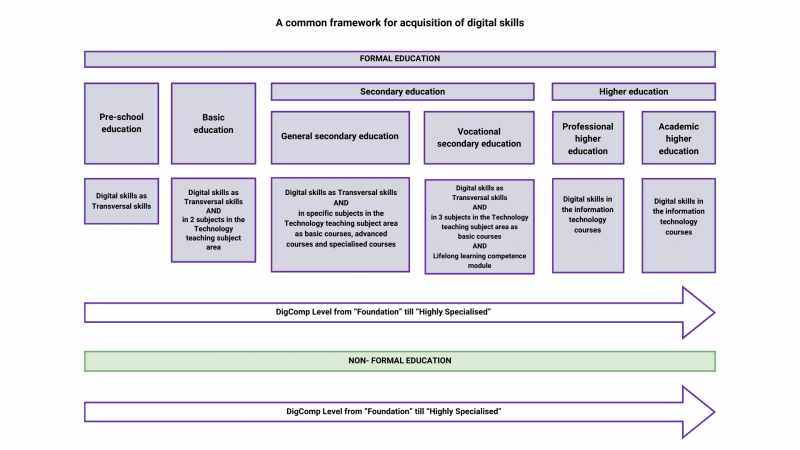In line with the “Guidelines for Digital transformation 2021-2027” – a national level policy planning document outlining unified state policy for the digital development of public administration, the economy and society - Latvia has set the development of society's digital skills as one of its policy priorities, with the expectation that every individual should be provided with the opportunity to acquire the necessary digital skills at any stage of life to exercise their basic rights, compete in the labour market and participate fully in the processes of modern society.
According to the Digital Decade 2023 report on Latvia, the indicators for both digital skills at least at the basic level (51%) and digital skills above the basic level (24%) are slightly lower than the EU average (54% and 26%, respectively). Current national policy planning documents, namely the Education Development Guidelines 2021-2027 and Guidelines for Digital transformation 2021-2027, set the objective of the acquisition of digital skills at all levels of education as a cross-cutting goal and aim at reaching 70% of adult population (age group 16-74) with at least basic digital skills by 2027.
To establish a common framework for the assessment of basic digital skills and the identification and planning of training needs, a systematic and gradual approach has been chosen by the state.
During the period 2014-2020, in the formal education system, including basic and secondary education, a stable foundation has been created to ensure modern and high-quality education with the introduction of the competence approach in the curriculum (Skola2030). Through amendments to several Cabinet of Ministers regulations, curricula and assessment criteria have been strengthened across all study fields, including digital literacy.
At the same time, to address digital skills for the adult population, two main directions have been chosen, outlined in the Education Development Guidelines for 2021-2027: (i) a revision of national higher education standards to identify appropriate study outcomes and acquired competences; and (ii) introduction of common quality principles for the design and implementation of non-formal education programmes. The inclusion of non-formal education in the common framework is particularly important as an operational response to the learning needs of the population in age groups that typically no longer take part in formal education.
Statements of what an individual should know, understand and be able to do at the end of a learning process are defined in terms of competences (knowledge, skills, responsibility, and autonomy) which together form the concept of learning outcomes. The concept of learning outcomes is a key element in the common framework that the state has established in digital literacy across the education system in Latvia.
Digital competence, in particularly basic digital skills, next to literacy and numeracy, has been defined as the basis for lifelong learning and those skills helps to use digital technologies effectively, wisely, and responsibly. Recommendations of the Council of the European Union on key competences for lifelong learning adopted in May 2018 identifies eight key competences essential to citizens for personal fulfilment, a healthy and sustainable lifestyle, employability, active citizenship, and social inclusion where digital competence is one of them.
Digital competence involves the confident, critical, and responsible use of, and engagement with, digital technologies for learning, at work, and for participation in society. Digital competence is complex concept which includes information and data literacy, communication and collaboration, media literacy, digital content creation, safety, intellectual property related questions, problem solving and critical thinking.
Latvia like other EU Member States in their education systems for assessment of the digital skills uses the approach of the framework of the Digital Competences of European citizens (DigComp), which provides a common understanding of what digital competence is. The DigComp is deemed as central to EU objectives of enhancing digital skills. The framework identifies the key components of digital competence in the five areas and 21 specific competences. It also describes eight proficiency levels, examples of knowledge, skills and attitudes, and use cases in education and employment contexts. The DigComp is used for multiple purposes, such as designing competence assessment tools, creating training courses and materials, and identifying professional digital profiles, in the contexts of employment, education and training, and social inclusion.
A learning outcomes approach to curriculum design focuses on application and the complex integration of knowledge, abilities and attitudes. Learning outcomes explicitly outline performance expectations and identify what the learner is expected to know and do by the end of the learning experience. The learning outcomes principle is - explicitly since 2004 - systematically promoted in the EU policy agenda for education, training and employment at national level, the learning outcomes form the basis on which national qualifications frameworks are built and is increasingly influencing the definition and writing of qualifications and curricula as well as the orientation of assessment and teaching and training. The 2017 European Quality Framework recommendation defines learning outcomes as ‘…statements of what an individual should know, understand and/or be able to do at the end of a learning process, which are defined in terms of knowledge, skills and responsibility and autonomy’. The learning outcomes perspective is used for a number of different purposes, the most important being:
- Qualifications frameworks and their level descriptors
- Qualification standards
- Curriculum development
- Assessment and validation
- Quality assurance
- Teaching and training
For all these purposes the learning outcomes approach strengthens the focus on the individual learner and the level of knowledge, skills, and competence s/he is expected to achieve.
In Latvia the transition to a learning outcomes approach, incl. defining digital skills as cross-cutting skills was firstly defined in the Education Development Guidelines for 2014- 2020 adopted by the Saeima on 22 May 2014 and further in the Education Development Guidelines for 2021-2027 adopted by the Cabinet of Ministers on 22 June 2021.



